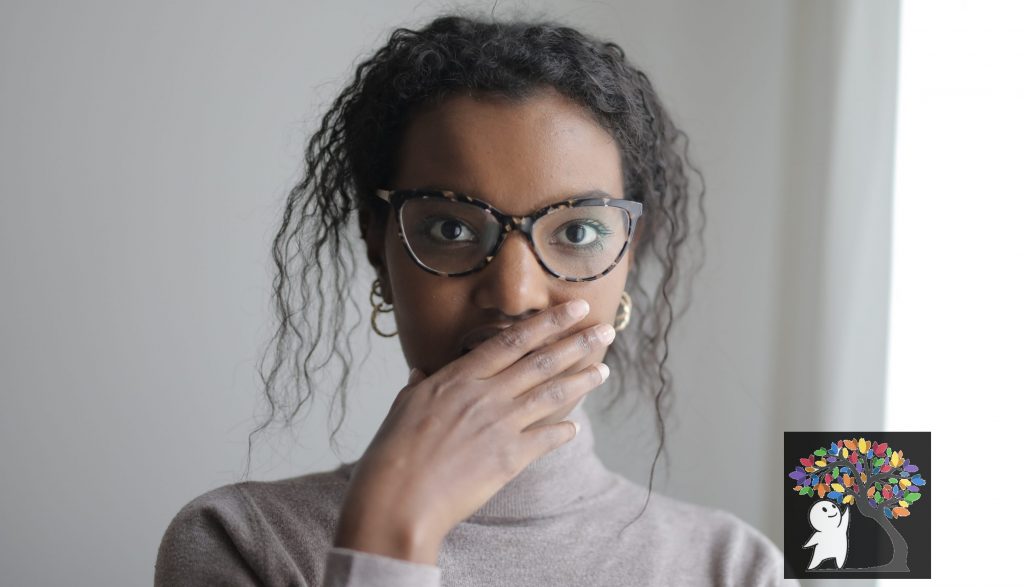6 Common Emotions & What They Really Mean

How many emotions can you name? Go ahead, I’m waiting… Well, while you may be able to name the basic six emotions, there are actually quite a few that are named. According to researchers Alan S. Cowen and Dacher Keltner from a 2017 study on emotions, they identified “27 varieties of reported emotional experience.” That’s way more than the common six emotions you may know, surprise, happiness, sadness, anger, fear, and disgust. But it’s nice to the basics. What do these emotions really mean? And what are some of the common and uncommon reactions we may have from experiencing them? Well, here are six common emotions and what they really mean.
1. Surprise

Surprise is one of those emotions we often experience briefly. Brought on by something we find unexpected, this feeling often startles us if unpleasant and can bring us joy if it’s brought on something positively unexpected. You know the feeling. We’ll often get a burst of adrenaline when startled, this sets in the fight or flight response, preparing us with the adrenaline to take action. You’ll often find yourself raising your eyebrows, or being left with wide-eyes, jaw dropped if you’re really surprised. This emotion can affect your memory as well. According to VeryWellMind, “Research has […] found that people tend to be more swayed by surprising arguments and learn more from surprising information.” And that: “people tend to disproportionately notice surprising events”. Makes sense how that surprise birthday party of yours was more memorable than the time you just ordered pizza with your pet turtle Larry. Ah, good ol Larry with the surprises…
2. Happiness

Happiness. Who doesn’t get happy just thinking about a fond memory or fun experience? Happiness can be brought on in all sorts of ways. Everyone aims to be happy, and we can’t seem to get enough of it. One 2015 study published in the journal PLOS ONE, monitored subjects emotions through a smartphone app. The sample size was exceptionally large at over 11,000 subjects participating in the study. According to the study, they found that: “participants experienced at least one emotion 90% of the time. The most frequent emotion was joy, followed by love and anxiety. People experienced positive emotions 2.5 times more often than negative emotions, but also experienced positive and negative emotions simultaneously relatively frequently.” Joy counts as happiness, right? Well, joy is a bit stronger but… I think it counts. A lot of people think attaining certain luxuries or having specific things they desire in their lives will ultimately make them happy forever. But, it’s a little more complicated than that. Happiness and health are widely viewed as being connected. A 2015 study published in the journal Social Science & Medicine, revealed that: “overall happiness is related to longer lives among U.S. adults. Indeed, compared to very happy people, the risk of death over the follow-up period is 6% (95% CI 1.01–1.11) higher among individuals who are pretty happy and 14% (95% CI 1.06–1.22) higher among those who are not happy, net of marital status, socioeconomic status, census division, and religious attendance.” Good idea to start delving into our passions more often, spending time with those who make us happy, and doing other activities we love.
3. Sadness

Sadness, we all experience it. There are many ways we respond to this feeling. We may cry, suddenly be quiet, isolate, or feel lethargic when experiencing this feeling. If we often experience long-periods of sadness, this can lead to depression. When this happens, it’s best to reach out and get the help you need by talking to a trusted loved one or counselor. Sadness can present some interesting responses and coping mechanisms. Some may turn to self-medication such as alcohol or other drugs, while others may ruminate for long periods of time on their worries or anxious scenarios. It’s best to engage your mind with an activity that may turn your sadness into a more content state if not happiness. Why? Because these negative coping mechanisms mentioned often lead to longer periods of experiencing sadness. So when you’re not feeling as happy as before, call a friend, grab a snuggly plush, or watch a favorite film to create a response that may make you feel happy.
4. Anger

This emotion can often come out as a reaction to a threat. We may frown or raise our voice when we’re angry. We’ve all experienced those feelings of frustration and hostility towards a person or activity we dislike. Anger can sometimes bring about some physiological responses like when our face turns red in a heated argument or when we sweat when we’re in an aggravating conflict. Anger can help us recognize when a situation or relationship is unhealthy and we need to get out, so it’s not to be dismissed altogether in certain conditions. Excessive anger can lead to aggression or abuse if not controlled. If you’re having trouble controlling your anger it’s a good idea to visit someone who can help like a counselor or therapist. They can teach you the tools and methods you need to manage your anger. There are also some serious physical side effects linked to anger as well such as diabetes, coronary heart disease and more according to VeryWellMind. They also note that: “anger has been linked to behaviors that pose health risks such as aggressive driving, alcohol consumption, and smoking.” Learning the right methods to respond to anger for you may help you manage any excessive anger you may be experiencing. Reaching out for help is a great first step towards getting back to that feeling of joy. Yes, a slightly stronger feeling than happiness.
5. Fear

Remember the fight or flight response? We often either react to a conflict by fighting or fleeing? Yeah fear has a great part to play in this response. Fear is a normal response to danger or a close threat. In the face of danger, you’ll often react due to a feeling of fear, which starts that fight or flight response. Your heart rate will increase and your muscles will become tense. Time may feel like it’s slowing down. A study from researchers at Baylor College of Medicine in Houston had volunteer subjects dropped from a great height into nets that would break their fall. Subjects estimated that their fall time lasted a third longer than the subjects they watched fall. Scientists explain this feeling of time slowing down as a trick on one’s memory. The area of our brain called the amygdala becomes more active than normal when we’re scared. Which means there’s more sets of memories being created than the ones the other areas of our brain usually have made out for us. Ah, so time doesn’t really slow down? Sure does feel like it when I’m afraid or excited.
6. Disgust

Disgust. You’ve likely tasted a foul food, or stepped in something not-too-pleasant while taking your dog for a walk at the park. Our nose wrinkles and we head for the hills when we’re disgusted from certain things. We may also have some physical reactions such as gagging or even puking. People may also feel what some call ‘moral disgust’ when they exhibit others doing something immoral or acting against their core values. But researchers believe our more simple responses to disgust are related directly to disease from a young age. A 2009 journal article published in the Psychological Bulletin suggests that: “disgust is evoked by objects/people that possess particular types of prepared features that connote disease. Such simple disgusts are directly disease related, are acquired during childhood, and are able to contaminate other objects/people.” The study also looks to more complicated forms of ‘disgust’. The journal article suggests that: “the complex disgusts, which emerge later in development, may be mediated by several emotions. In these cases, violations of societal norms that may subserve a disease-avoidance function, notably relating to food and sex, act as reminders of simple disgust elicitors and thus generate disgust and motivate compliance.” Whoa, all this talk of disgust makes me feel… well, a bit disgusted.
So, which of these emotions do you feel most often? Which do you hope to feel more of? Joy? Or Happiness? Aren’t they the same thing?? No? Yeah? Not really? Yeah, I know. Hey, they’re closely related though.
We hope you enjoyed this article and learned something new! Thanks for reading!
Written by Michal Mitchell
Follow me on Instagram and Twitter at @jackycoocoo for more articles, celebrity interviews, original poetry and more.
Check out “What Your Favorite Food Says About You, According to Research” or my other articles here.
References:
- Cowen, A. S., & Keltner, D. (2017, September 19). Self-report captures 27 distinct categories of emotion bridged by continuous gradients. PNAS. https://www.pnas.org/content/114/38/E7900.
- Cherry, K. (2021, April 6). The 6 Types of Basic Emotions and Their Effect on Human Behavior. Verywell Mind. https://www.verywellmind.com/an-overview-of-the-types-of-emotions-4163976#citation-6.
- Lawrence, E. M., Rogers, R. G., & Wadsworth, T. (2015, September 18). Happiness and longevity in the United States. Social Science & Medicine. https://www.sciencedirect.com/science/article/abs/pii/S0277953615301222?via%3Dihub.
- Trampe, D., Quoidbach, J., & Taquet, M. (2015, December 23). Emotions in Everyday Life. PloS one. https://www.ncbi.nlm.nih.gov/pmc/articles/PMC4689475/#:~:text=The%20most%20frequent%20emotion%20was,negative%20emotions%20simultaneously%20relatively%20frequently.
- Choi, C. Q. (2007, December 11). Why Time Seems to Slow Down in Emergencies. LiveScience. https://www.livescience.com/2117-time-slow-emergencies.html#:~:text=Indeed%2C%20in%20the%20real%20world,an%20illusion%2C%20scientists%20now%20find.
- Cherry, K. (2019, July 17). Emotions and Types of Emotional Responses. Verywell Mind. https://www.verywellmind.com/what-are-emotions-2795178.
- Posted June 27, 2019 by U. W. A. | P. and C. N. (2020, June 22). The Science of Emotion: Exploring the Basics of Emotional Psychology. UWA Online. https://online.uwa.edu/news/emotional-psychology/.
- Oaten, M., Stevenson, R. J., & Case, T. I. (2009). APA PsycNet. American Psychological Association. https://doi.apa.org/doiLanding?doi=10.1037%2Fa0014823.
- Adams, C. B. L. (2019). What Do Your Emotions Mean? Psychology Today. https://www.psychologytoday.com/us/blog/living-automatic/201903/what-do-your-emotions-mean.



Responses